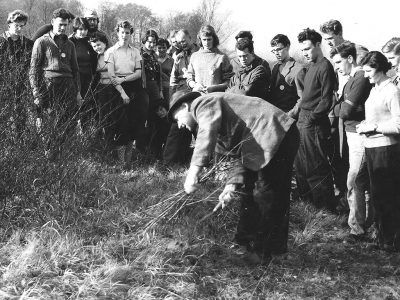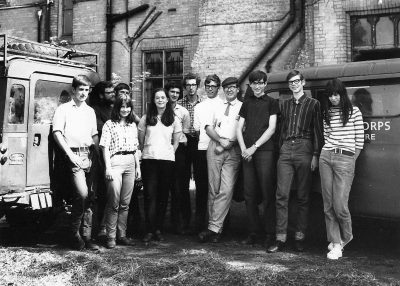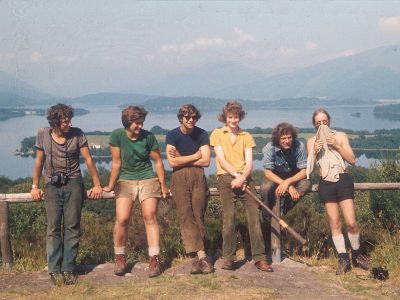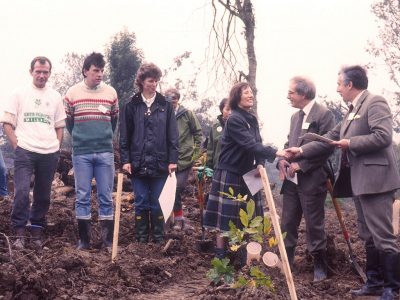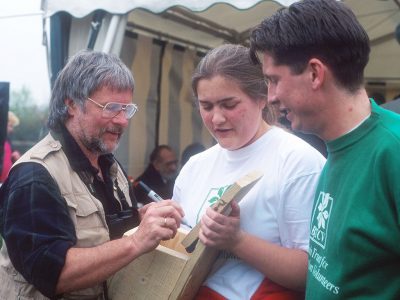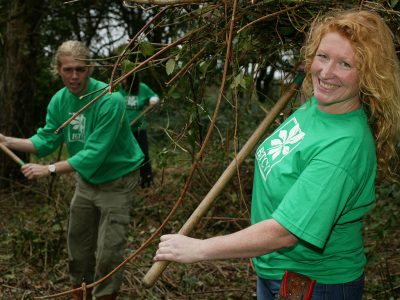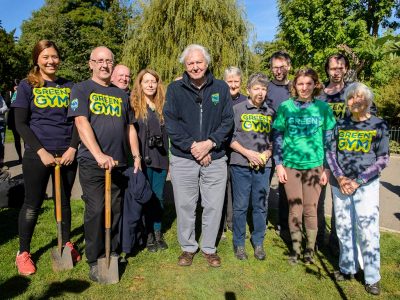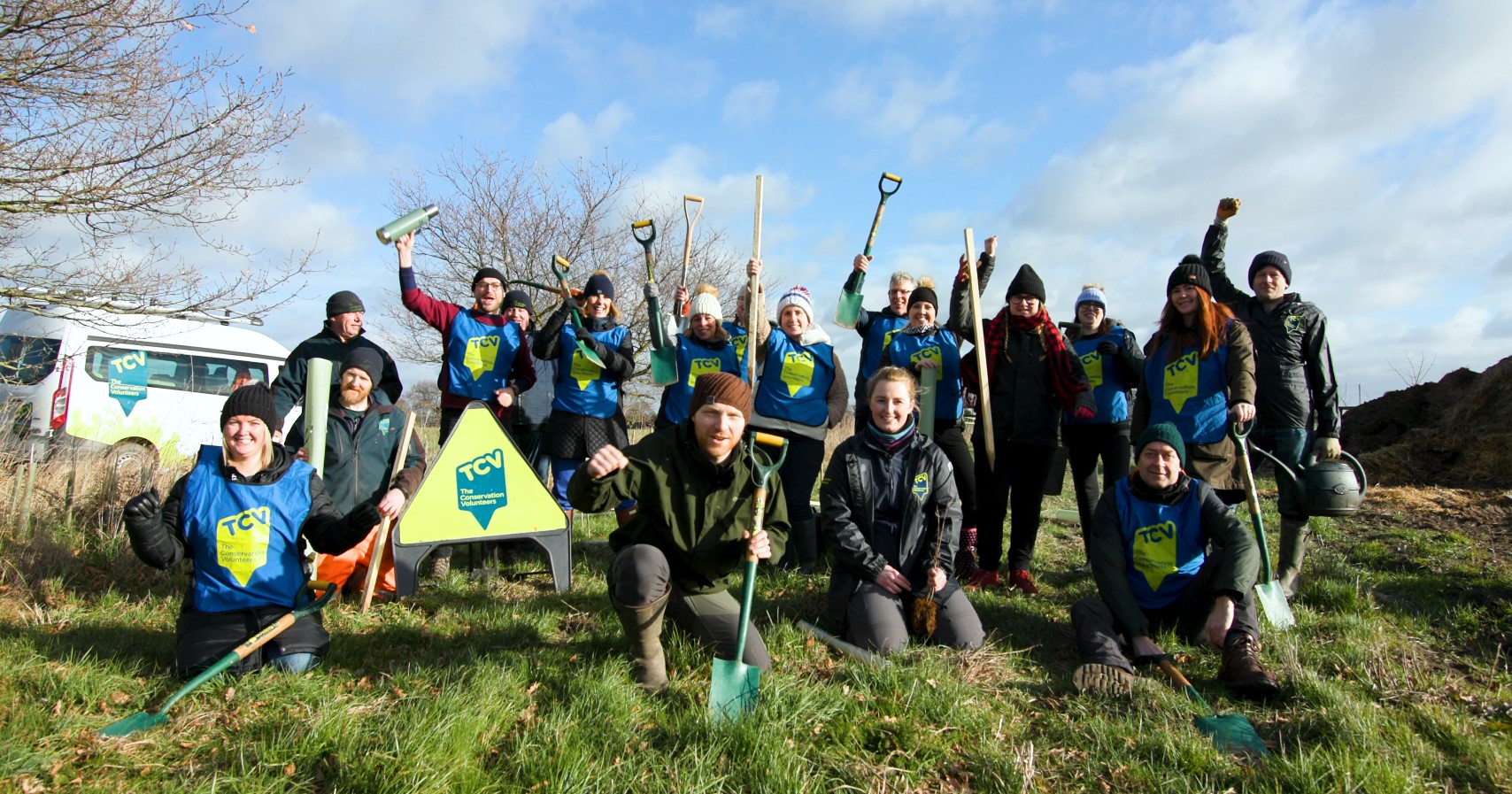For the past 65 years, TCV has worked across the UK creating healthier and happier communities for everyone.
Today TCV delivers 115,000 volunteer days each year, supporting people taking action to improve their urban and rural surroundings. Each project improves our world in small but profound ways, connecting people and green spaces to deliver lasting outcomes for both.
Where we started | Conservation Corps | 1950s | 1960s | 1970s | 1980s | 1990s | 2000s | 2010s | 2020s
Where the movement started…
In a warm February weekend in 1959, 42 volunteers, botanist David Bellamy among them, gathered at Box Hill in Surrey to improve the landscape and wildlife value of the area by clearing away scrub to encourage the natural chalkland flowers to grow.
I was a young botanist at the time, living near Box Hill. I was out walking with my research director that day in 1959 and we stumbled across the group of Conservation Corps clearing the scrub, and mucked in.
David Bellamy OBE
Their efforts were the very first activity of BTCV (the British Trust for Conservation Volunteers), or the Conservation Corps, as we were known back then.
The Conservation Corps
TCV started life as the Conservation Corps, set up by the Council for Nature in 1959. The Council for Nature was an umbrella body of natural history organisations, including the RSPB and WWF.
The Conservation Corps was born out of a mix of environmental and social need and tapped into a growing enthusiasm for conservation work at the time. Although the National Parks and Access to the Countryside Act had become law in 1949, supporting the creation of National Parks and Areas of Outstanding Natural Beauty, it was soon realised that these areas needed to be maintained if their natural splendour were to be properly preserved.
The Conservation Corps gave young volunteers the opportunity to carry out practical conservation to protect the environment and in return give them new skills and a sense of purpose.
So, the Council put out an advert for an organiser of the Conservation Corps and in January 1959, Brigadier Edward Armstrong was appointed to the position. He had served in Burma during World War Two.
It was Brigadier Armstrong who led that first task out in Surrey on 22 February 1959.
I have a very vivid recollection of our opening weekend at Box Hill. We were blessed with a summer-like weekend of warmth and sunshine. The goodwill, the comradeship and happiness which have always been the features of our working parties, were quickly established among our team. It was a great and happy start to the life of the Conservation Corps.
The late Brigadier Armstrong, speaking in 1989
That first year, hundreds of people came forward to volunteer for the Conservation Corps. There were seven further tasks in 1959, and twice as many people volunteered as could be involved.
Founded in the 50s
The Conservation Volunteers' roots are established through the creation of the Conservation Corps.
Brigadier Armstrong is appointed by Council for Nature to form the Conservation Corps in order to involve volunteers in practical conservation work.
First project held at Box Hill in Surrey. Forty-two volunteers, including David Bellamy, clear dogwood to encourage the growth of juniper and the distinctive chalkland flora.
Stretching in the 60s
The Conservation Corps expands its programme of practical tasks with most practical work taking place at nature reserves in the countryside. A training and education remit are introduced.
1964
Conservation Corps expands its activities to include education and amenity work in the countryside.
1966
Conservation Corps moves from a basement office at Queen's Gate, Kensington to new premises at London Zoo in Regent's Park.
1968
The first training course for volunteers marks the beginning of an ongoing commitment to the provision of training for volunteers and staff.
1969
Membership has increased to 600 and volunteers are completing 6,000 work days per year.
The first ever international exchange visit to Czechoslovakia, where volunteers study the wildlife and land management of the Low Tatra Mountains paves the way for a series of international exchanges, resulting ultimately 20 years later in the international project programme.
Striding into the 70s
The Conservation Volunteers is established as an independent organisation and opens offices around England, Wales and Scotland. Volunteer numbers continue to rise.
1970
Conservation Corps takes over its own responsibilities and operates under the new name of British Trust for Conservation Volunteers (BTCV). The new horse chestnut leaf logo is launched.
HRH Duke of Edinburgh KG KT becomes Patron.
1971
Local group affiliation scheme is launched (TCV’s Community Network). By 1974 a total of 57 groups have joined.
1972
Conserver magazine makes its debut and the Cooks Handbook and Organising a Local Conservation Group are published, both as a result of volunteer effort.
1974
The number of registered volunteers reached 3,000
1975
"Conservation Corps Week" in October results in a dramatic rise in enrolment and a BTCV membership scheme is introduced.
1977
As part of Jubilee year, BTCV works with Environment Committee of the London Queen's Silver Jubilee Committee to set up a unique ecological park opposite Tower of London.
1979
BTCV moves to new headquarters in Reading. The first group from Northern Ireland affiliates to BTCV.
Expanding in the 80s
The focus of BTCV's activities begins to shift to include the urban environment and community action.
1981
There are 350 local groups affiliated to BTCV and the number of BTCV Natural Breaks has reached 280 per year.
1982
BTCV joins the Nature Conservancy Council, Civic Trust and Shell (UK) as a partner in the 12-year-old Shell Better Britain Campaign.
1983
A separate Northern Ireland region is established as Conservation Volunteers Northern Ireland (CVNI).
Links are established with the newly established Groundwork Trust in North West England and the two organisations work together to improve the urban environment.
Midweek projects are introduced with the aim of involving unemployed and retired people in conservation work.
1984
BTCV's new Wallingford headquarters is officially opened.
Six conservation volunteers travel to Iceland to help the Icelandic Nature Conservancy Council to set up a conservation volunteer movement. During the summer several BTCV groups help to repair a badly eroded footpath in Skaftafell National Park.
1988
In response to the losses incurred by the 1987 hurricane, BTCV launches the Million Tree Campaign with the support of Esso and the Countryside Commission.
A European Commission grant enables BTCV to employ an International Development Officer to establish working holidays in each European country.
1989
Membership has grown to 10,000 - over 25 times the number involved in 1959 and the Natural Break programme is the largest of its kind in Britain, involving over 6,000 people each year.
New Directions for the 90s
BTCV expands throughout the decade. The emphasis is on people and society as well as the environment with BTCV emerging towards the end of the 1990s as a key player in initiatives such as the government's New Deal and Millennium Volunteers programmes.
1990
Conservation Volunteers Ireland, the first independent organisation established as a direct result of BTCV's European Commission funded International Conservation Action Network is established.
1991
BTCV's three-year Million Tree Campaign reaches its target with the planting of the millionth tree by Vice President David Bellamy at Watergrove Reservoir in Lancashire. A new phase of the campaign - The Second Million - is launched and the emphasis shifts from planting towards woodland management and aftercare.
1993
BTCV runs its first Woodland Action Week sponsored by Esso. The emphasis is on nurturing the season's young trees.
The 1000th Local Group joins BTCV's Local Group Membership Scheme.
1994
Broadcaster David Jacobs plants BTCV's Second Millionth Tree at Two Storm Wood in Richmond Park, Surrey.
1995
The government supported Environmental Training Organisation, of which BTCV is a founder member, is launched to promote high quality training in the environmental sector.
1996
BTCV runs its first national Pond Campaign.
1997
The Natural Pioneers Millennium Award Scheme funded by the Millennium Commission and supported by Marks & Spencer is introduced by BTCV.
Ten conservation volunteering organisations from around the world gather at Henley Management College in Oxfordshire to debate the international future of conservation volunteering and lay the foundations for the Conservation Volunteers Alliance.
Scottish Conservation Projects Trust's membership agree to a formal amalgamation with BTCV.
1998
BTCV joins forces with Dr William Bird of Sonning Common Health Centre in Berkshire to introduce the BTCV Green Gym project.
BTCV launches its new Urban Handbook.
1999
BTCV celebrates its 40th anniversary with the launch of a new Strategic Plan for the period 2000 - 2004 ‘Expanding the boundaries of conservation volunteering'.
The Conservation Volunteers Alliance is officially launched in May at Clandeboye in Northern Ireland.
BTCV is the largest recipient of first round funding in the government's new Millennium Volunteers programme.
Following the success of the Green Gym, BTCV publishes "A practical guide to setting up a Green Gym" and sets up a new pilot project in Brighton.
The Noughties - New horizons for the new millennium
BTCV launches its Millennium Volunteers programme providing over 3,000 volunteering placements for young people aged 16-24.
BTCV becomes one of the largest environmental sector providers of training and support to unemployed people in the UK.
The BTCV Conservation Holidays programme wins a British Airways Tourism for Tomorrow Award for its project in Gomorszolos, Hungary.
2001
BTCV is chosen by the New Opportunities Fund to run the People's Places Award Scheme, a major grants programme for community environment projects in deprived areas.
BTCV secures its first contract with a Learning Skills Council to deliver apprenticeships.
Conservation Volunteers Northern Ireland Millennium Tree Campaign exceeded its targets, planting more than 1.6 million trees.
2002
The foot and mouth epidemic has a major impact on rural activities. BTCV staff and volunteers work hard to make up for lost volunteer and environmental opportunities. Despite the outbreak, BTCV achieves its highest recorded workdays total, over a quarter of a million days.
BTCV's groundbreaking Environments for All programme reaches out to new volunteers, particularly from black and minority ethnic and marginalised communities.
2004
BTCV launches its strategic plan Inspiring People, Improving Places setting out its vision for the next four years, including an ambitious target to involve more than 1 million people.
BTCV's innovative work in involving communities traditionally under-represented in the environment sector is recognised at our Environments for All Conference.
2005
The Prudential Grass Roots programme is launched, enabling BTCV to support the regeneration of green spaces close to shopping centres managed by Prudential Property Investment Managers Ltd.
As part of the UK Year of the Volunteer, BTCV runs a highly successful Environment Month, recruiting many new volunteers.
2006
BTCV launches Spring into Action backed by TV gardener Charlie Dimmock and supported by Prudential, the Cabinet Office and BBC Breathing Places. The six-week campaign engages nearly 19,000 volunteers.
Sedum House, BTCV's new head office, is opened in Doncaster by Ed Miliband, Minister for the Third Sector. It wins awards for its environmentally sustainable design.
BTCV's People's Places Award Scheme draws to a close, having awarded over £4 million to more than 500 community groups.
BTCV's Patron HRH The Duke of Edinburgh gives out the first BTCV Green Hero Awards, recognising the dedication and achievements of BTCV volunteers and groups.
BTCV launches its Community Champions Scheme.
BTCV's vital role in the sector is recognised with strategic funding for the next five years from the Office of the Third Sector.
2007
BTCV's expertise in involving young people is recognised with the launch of two new programmes aimed at 16-24 year olds – Greenprints and My Space? Our Space!
2008
BTCV announces a new partnership with The Royal Bank of Scotland Group (RBS) for employee volunteering events across the UK.
The Green Gym celebrates its 10th Anniversary. More than 70 Green Gyms are now in operation across the UK.
BTCV's third annual Spring into Action campaign involves more than 20,000 volunteers at 770 sites across the UK.
Bill Oddie, TV presenter and BTCV Vice-President, presents a Network Rail Environment Award to BTCV volunteers for work at a site in Great Stukeley, Cambridgeshire.
BTCV publishes social return on investment research that shows £1 invested in environmental volunteering can lead to a return of up to £4.
A change of name in the 2010s
2011
TCV opens the Greenwich Meantime Nursery, a unique project using vacant development land to create a resource for nature conservation, biodiversity and sustainability.
TCV launches Well-being Comes Naturally, a partnership with Mind which aims to engage people experiencing mental distress and to integrate them into our conservation projects.
1st May 2012 - BTCV becomes known as TCV
2012
TCV launches the Big Tree Plant, on behalf of DEFRA. This three-year programme works with volunteers and community groups to plant 150,000 trees England-wide
The Hollybush team of staff and volunteers are trained to use British Sign Language (BSL) or Makaton to overcome the communications barrier of working with a number of deaf volunteers.
20,000 people and counting visit Skelton Grange Environment Centre with Access to Nature, an exciting project that works with volunteers to create welcoming, well managed, wildlife-rich sites across Leeds.
Health for Life – a unique food growing programme launches in Birmingham. Funded by Mondelez International Foundation and, run in partnership with Birmingham Health Education Service, the programme promotes fun activities that engage people in growing food, physical activity, healthy eating and cookery.
2013
TCV hold a National Green Impacts Conference to share the findings of a three-year study aimed at proving the benefits of volunteering for health and wellbeing. Research showed that involvement in volunteering has a positive impact on attitudes and behaviours towards the environment, lifestyles and willingness to engage in the local community.
TCV’s Natural Communities Apprenticeship Programme launches. Natural Communities Apprenticeship Programme provides trainees with a practical and flexible methodology for engaging everyone to enjoy, understand, value and care for the green places around them.
2014
TCV welcomes Jonathon Porritt as President
David Slater celebrates 50 years of volunteering at TCV, David is one of TCV’s longest-serving volunteers and advises anyone considering volunteering to “go for it"
TCV wins a top award from the World Health Organisation (WHO) for TCV’s ‘Growing Communities’ in Belfast. TCV won the 'Healthy Places' Award as part of Belfast’s WHO Healthy Cities initiative.
2015
TCV launches a new partnership with OVO Energy to get the UK planting as part of the exciting ‘I Dig Trees’ planting programme. On behalf of its Greener Energy Plan, OVO funds over 158,000 free trees for volunteers and community groups to plant across the UK.
Considerable growth and recognition for TCV's Green Gym. This growth was supported by funding from the Cabinet Office and innovation foundation, Nesta.
Green Gym wins a coveted Health and Wellbeing Award from the Royal Society for Public Health. These awards recognise achievements in the promotion of health and wellbeing through policies that empower communities and individuals, improve the population’s health and address the wider social determinants of health.
TCV works in partnership with Adur and Worthing Councils (South coast of England), on a Department for Communities and Local Government's funded 'Rethinking Parks' pilot.
2016
TCV celebrates our Vice President, Sir David Attenborough 90th birthday. Volunteers, staff and supporters of TCV join Sir David in Waterlow Park in North London to plant an elm tree in his honour.
TCV works with the Glasgow and Clyde Valley Green Network Trust (GCVGNT) on an exciting new community rewilding project also funded by the Robertson Trust. The project works with deprived communities in Glasgow and the Clyde Valley.
After five terrific years, TCV’s Kent Heritage Trees project comes to its conclusion and plants its last heritage tree. The project, funded by the Heritage Lottery Fund, demonstrated the important contribution trees make to both our environment and the cultural life of our communities.
TCV’s Natural Talent programme has run for 10 years filling the substantial gap in ecological skills across the UK. 95% of Natural Talent trainees are now active in the conservation sector, using skills and expertise gained with TCV.
2017
TCV launches Growing Communities - a major new environmental scheme to enable communities in West Sussex to improve their health and wellbeing.
TCV’s Green Gym features in a new study commissioned by BBC2’s Trust Me I'm A Doctor to investigate the effects of different activities on stress levels.
The Roundhouse is officially opened in Hollybush, providing a warm place for volunteers to plan the day’s activities, enjoy a well-deserved break when working outdoors or do preparatory work during the cold winter months.
TCV announce a new partnership with Dementia Adventure to expand outdoor activity for people with dementia.
TCV’s practical conservation handbooks are digitised and available for a modest subscription, providing practical guidance to create and manage many aspects of rural and urban green spaces.
TCV launches new Community Network Membership benefits, providing community groups with a dedicated website, competitively-priced insurance, discounts on merchandise, funding information, access to grants and much, much more.
TCV receives significant funding from players of People's Postcode Lottery, to support our volunteering programmes in community green spaces. This funding helps to transform even more of Great Britain’s precious green spaces, improving the natural environment whilst enhancing local people’s health and wellbeing and sharing new skills and knowledge.
2018
TCV launches a refreshed Strategy - “Connecting People and Green Spaces” to deliver lasting outcomes for Communities, the Environment, Health & Wellbeing and Learning & Skills.
TCV Green Gym celebrates it’s 20th Year with special events in recognition of the first Green Gym which started in Sonning Common and is still going strong.
2019
TCV celebrates it's 60th Anniversary and continues to create healthier and happier communities for everyone.
Free membership to the TCV Community Network across the UK, supported in Great Britain by players of People's Postcode Lottery.
Hollybush started a fantastic year-long project with £280k funding support from Veolia Environment Trust, Wates Group, National Grid and Leeds Civic Trust.
The 2020s - navigating a new era
2020
As the severity of the Covid-19 pandemic became clear, we took a step that was unprecedented in our history – ceasing our volunteering programmes in late March. Throughout April, all but essential site maintenance and safety activities – conducted by our employees – stopped. Volunteering slowly resumed aligning to government guidance.
Our Belfast team of volunteers received the Queen’s Award for Voluntary Service, known as the MBE for volunteer groups and held a ceremony to receive the award from Lord Lieutenant of Belfast.
We were part of the iconic celebrity fundraising event, ICAP Charity Day, allowing us to engage and educate 15,000 schoolchildren in the great outdoors through the ICAP Fruit Tree Initiative – From the Ground Up!
TCV was part of The (inaugural) Massive Get Together, which saw 10 charities collaborate on an online fundraising event. The evening was streamed live and comprised celebrity entertainment, prize draws and lots of laughs, all while raising more than £40,000 for good causes.
With 32,000 native trees, we planted the largest mini urban forest in Europe – the Forest of Thanks in Barking – as a thank you to all the key front-line workers and NHS staff that did so much for their communities during the pandemic. The forest was created using the Miyawaki method.
2021
We launched our ambitious strategy “For people and green spaces: a thriving network for everyone”, which reflected on how the climate and ecological emergency must inspire action at all levels of society.
TCV became a delivery partner of The Queen’s Green Canopy (QGC), a unique tree planting initiative which invites people from across the United Kingdom to “Plant a Tree for the Jubilee.”
In Northern Ireland, we announced a new partnership with National Museums NI, which saw our North Down operations and native tree nursery move to the grounds of the Ulster Folk Museum at Cultra.
We exhibited our work in the COP26 Green Zone in Glasgow. COP26 volunteers also took practical action to improve local green spaces in a series of ‘hands-on’ conservation days run by TCV in Glasgow.
2022
TCV and NatWest celebrated 15 years of partnership and recognising the vital role trees play in addressing the climate change challenge, we added tree planting to our partnership focus. In 2022-23, together we planted 60,700 trees to commence the creation of the NatWest Forest.
TCV became the new managing agent for Port Sunlight River Park, Merseyside. A former landfill, the 70-acre site was reclaimed and revitalised by landowners The Land Trust alongside Autism Together, under a succession of dedicated park rangers and volunteers.
Following the death of Her Majesty, The Queen’s Green Canopy extended our vital tree planting initiative with an extra 20,000 trees until the end of March 2023. This gave people the opportunity to plant trees in memory of Her Majesty. TCV was honoured to help create a living legacy to remember Her Majesty’s extraordinary service to her country and her people.
We gave away over 30,000 free trees to London and its communities as part of Trees for London and our new partnership with the Mayor of London.
At TCV Skelton Grange in Leeds, we celebrated an impressive 30 years of helping the local community, including over 100,000 young people and hundreds of Volunteer Officers aided into employment or further training. To celebrate the centre’s 30th birthday, we were joined by 120 people at a stakeholder event.
2023
TCV announced Jon Towler as our new Chair and wished departing Chair, Tony Crook, a huge thank you and farewell. As a strong advocate of the need for public bodies and third sector organisations to work together in an integrated manner, Jon noted his passion about TCV’s work with people and communities.
We formed an exciting tree planting partnership with youth charity The Duke of Edinburgh’s Award. As an approved activity provider for DofE, TCV supported Gold DofE participants as they undertook a green skills or tree planting project for at least 12 months.
TCV appeared on Countryfile as part of a segment celebrating volunteer organisations taking part in The Big Help Out, an initiative that marked King Charles III’s coronation and encouraged the nation to volunteer and do something for their local community.
We were honoured to be joined by King Charles III, now TCV’s Patron, to plant an apple tree in the orchard of the historic Kinneil House and Estate in Bo’ness, near Falkirk. The celebration was to commemorate the centenary of the Estate becoming a public park, transformed from a former colliery site into a public open space of grassland, wildflower meadows and woodland.
TCV was part of an 80-strong charity coalition who launched a landmark 5-point plan for nature, the ‘Nature 2030’ campaign, with 5 key asks of political parties.
During National Tree Week, we were very proud to win two awards at the London Tree and Woodland Awards, which are affectionately known as the Tree Oscars.
The Mayor of London, Sadiq Khan, planted a tree at a Wandsworth-based community special school to commemorate funding half a million trees for London. TCV was there to celebrate as that ceremonial tree was a very special I Dig Trees tree.
2024
TCV’s 65th anniversary year!
As part of research with external sustainability consultants into the impact our incredible volunteers make on the environment and local communities, we released statistics to demonstrate TCV volunteers’ environmental outputs. Taking these into account for nature and society, TCV volunteers are estimated to have a natural and social value of £128.5m, cumulative over 30 years. Comparing this to TCV’s 2022/23 expenditure, this represents a return on investment of 14.5.
Rebecca Kennelly became our new CEO, joining us from The Duke of Edinburgh’s Award (DofE), where she served as the Executive Director of UK Operations. Prior to that, she was the Director of Volunteering for the Royal Voluntary Service, where she was awarded an MBE for her service during the COVID-19 response, as she was responsible for delivery of the NHS Volunteer Responders scheme.
